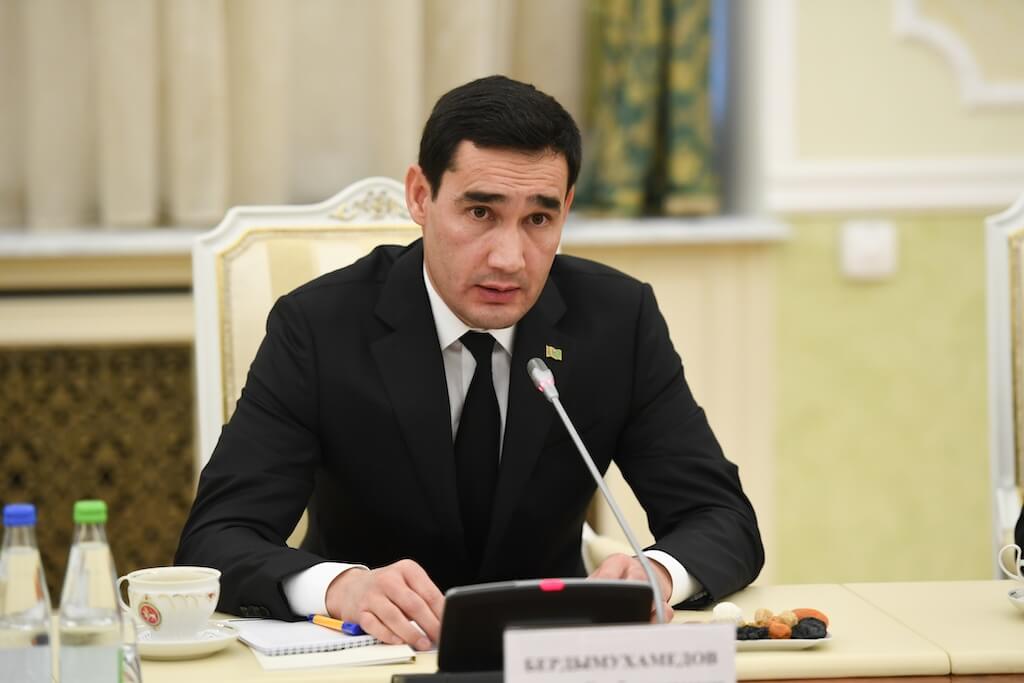Turkmenistan’s Central Election Commission (CEC) announced on Tuesday that Serdar Berdimuhamedov, the son of the country’s current leader, Gurbanguly Berdimuhamedov, has won the snap presidential election that was held on March 12. The vote, which was widely seen as rigged in favour of Berdimuhamedov, paves the way for hereditary succession in one of the world’s most tightly controlled countries.
Also Read: Who is Serdar Berdimuhamedov? The Man Widely Expected to be Turkmenistan’s Next Leader
Berdimuhamedov easily won the election by securing 72.97% of the votes, although it was lower than his father’s previous margins of victory. Gurbanguly respectively won the 2007, 2012, and 2017 elections with 89%, 97%, and 97% of the votes.
So unpopular! #Turkmenistan establishes first dynasty in #CentralAsia, but fails to gain nearly 100% of the vote https://t.co/nFD7MM7Xqx
— Joanna Lillis (@joannalillis) March 15, 2022
A total of nine candidates participated in the election, which saw a voter turnout of 97%, and the runner-up managed to secure only 11% of the vote. The CEC said that voting was conducted at 2,577 polling stations across the country and in 41 voting booths in Turkmen embassies and consulates abroad.
The new president of Turkmenistan's most exciting stunt so far is to speak English pic.twitter.com/4nfDD51WpO
— Peter Leonard (@Peter__Leonard) March 12, 2022
The election was “held in an atmosphere of openness and transparency” that reflected the “high level of democracy in the Turkmen society,” the CEC stated. Noting that the high level of participation demonstrated the “civil consciousness of the population,” the CEC claimed that the vote was held according to “generally accepted international standards.”
However, the voting was not monitored by international observers. In fact, the Organization for Security and Cooperation in Europe’s (OSCE) observer mission—the Office for Democratic Institutions and Human Rights (ODIHR)—stated a few days before the vote that the “lack of political pluralism and undue limitations on the exercise of fundamental human rights” in the Central Asian country is concerning.
'Early presidential elections were held in Turkmenistan on 12 March. Serdar Berdimuhamedow, the deputy prime minister and the son of the outgoing head of state, Gurbanguly Berdimuhamedow, was the victor, obtaining around 73% of the vote'.
— OSW – Centre for Eastern Studies, Poland (@OSW_eng) March 15, 2022
More ⤵️https://t.co/PIjYA7hYs0
“Exercise of fundamental freedoms is severely curtailed, inhibiting free expression of the voters’ will,” the ODIHR noted, adding that Turkmenistan has not been able to ensure the integrity of its election process, leaving the veracity of the result in doubt.
In a similar vein, the United States emphasised that Turkmen citizens have a “right to choose their leaders through free and fair elections and in a transparent manner.” The State Department said on Tuesday that Washington “concurs” with the ODIHR’s assessment and urged Ashgabat to implement electoral reforms according to ODIHR standards.
We call on the Government of Turkmenistan to align their electoral process with @OSCE recommendations. We will continue to support the people of Turkmenistan and their civil and political rights. https://t.co/T7NXnllhnA
— Ned Price (@StateDeptSpox) March 16, 2022
China, on the other hand, welcomed the election results. President Xi Jinping congratulated Serdar on his victory and said that he is “sincerely delighted at the rapid progress Turkmenistan has made in state-building and national rejuvenation over the past 30 years since its independence.” Furthermore, Xi stated that he is willing to work with the President-elect “to write a new chapter in the strategic partnership between the two countries.”
President of Pakistan, Dr. Arif Alvi, held a telephonic conversation with the President of Turkmenistan, Mr. Gurbanguly Berdimuhamedov, and the President-elect, Mr. Serdar Berdimuhamedov, today.
— The President of Pakistan (@PresOfPakistan) March 15, 2022
He discussed with both the leaders a wide range of bilateral issues and pic.twitter.com/EvuTOkmCJH
Serdar was also congratulated by Russian President Vladimir Putin, who said that the Serdar’s victory will rejuvenate the Russia-Turkmenistan “strategic partnership” and contribute to “stronger peace, security and stability in Central Asia and the Caspian region.”
The elder Berdimuhamedov announced last month that he intended to step down as the leader and that young people needed to have a shot at leadership. It is widely believed that Gurbanguly, who has been ruling Turkmenistan with a heavy hand since 2006, has been planning to transfer power to his son Serdar for some time now and has simply been biding his time. Serdar turned 40 last September, which is the legal age required to run for the Presidency.
Moreover, Gurbanguly has also stated his intention to retain his positions as speaker of the Senate and chairman of the Security Council, a move that will allow him to play an advisory role to Serdar.
Since becoming independent in 1991, Turkmenistan has been categorised as an authoritarian state and has never held free and fair elections. The country was initially ruled by strongman Saparmurat Niyazov from 1991 till his death in 2006, when Berdimuhamedov was appointed leader. Human Rights Watch (HRW) describes Turkmenistan as “among the world’s most repressive and closed countries, where the president and his associates have total control over all aspects of public life.”
The country is beset by corruption, food shortages, spiralling inflation, and high unemployment. As evidenced by this election, there is no political opposition, the media is controlled by the government, and political dissent and free speech are not allowed. It is widely expected that Serdar will follow in the footsteps of his father and merely seek to consolidate power rather than tackle any of the country’s many challenges.

